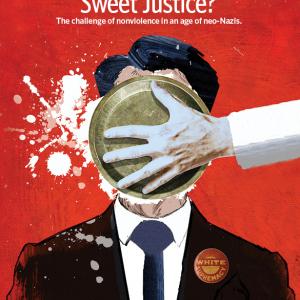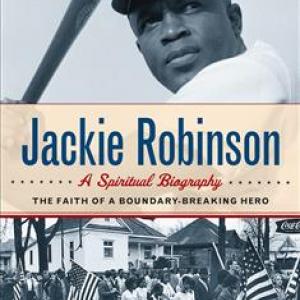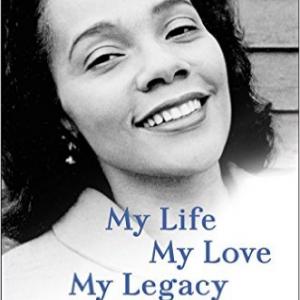Posts By This Author
Conversations Worth Having
Jesus, nonviolence, and justice.
EVERY SUMMER, we pause our magazine work to spend a few days at The Summit for Change, a gathering of faith and justice leaders hosted by Sojourners. Held at historic Gallaudet University, The Summit is Sojourners’ homecoming for old friends and new and also a time to practice two overlooked justice activities: honoring and blessing.
The first group of people we honor at The Summit are elders, leaders who’ve paved the way for us to follow. The elders we’ve honored over the years—including Rep. John Lewis, Marie Dennis, Walter Brueggemann, Ruby Sales, John Perkins—are heroes. We thank them for their pioneering leadership, learn from their wisdom, and ask for their blessing on our own work.
But we also honor new leaders—folks whose names may not be widely known but whose commitment to social justice is unmistakable. We recognize them for their efforts to create a more equitable and peaceful world before we offer our blessing on their work that lies ahead.
Is It Okay to Punch a Neo-Nazi?
Misconceptions and musings on nonviolence.
NEO-NAZIS AND WHITE SUPREMACISTS are marching again. Counterprotesters are opposing and disrupting. Where do Christians stand? In April, Sojourners senior associate editor Rose Marie Berger launched this question on social media: Is it okay for a Christian to punch a Nazi? A lively conversation followed, eventually generating nearly 100 replies—and about as many different understandings (and misunderstandings) of Christian nonviolence. Excerpts from the conversation below are edited and used with permission. —The Editors
Rose: Is it okay for a Christian to punch a Nazi? Discuss.
Maureen: Last time I checked it is not okay to punch anyone, no matter who you are. Right?
Nate: Yes. Pacifism doesn’t work against genocide. You have to have an opponent who can feel shame. Nazis call for the extinction of my people and have proven they are willing to try and carry that out.
Rose: Is pacifism the same as organized unarmed resistance?
Nate: In my head it has the same results against Nazis. Nazis are my only punching exception.
Larry: Ask Dietrich Bonhoeffer ...
Nate: Show me where Bonhoeffer succeeded in stopping the Nazis. I’ll wait.
Larry: He didn’t, but he didn’t resist passively.
Korla: Choosing to accept death for yourself is substantially different from choosing to accept it for other people, particularly from a position where you’re incredibly low on the list of targets. That’s cowardly and colonial.
New & Noteworthy: June 2018
Four culture recommendations from the editors.
Four culture recommendations from the editors.
New & Notworthy
Four May cultural recommendations from our editors.
Prison Nightmares
Rikers: An American Jail , a documentary film from journalist Bill Moyers, draws on interviews with former detainees at a notorious facility, New York City’s Rikers Island, for insight into the violence and futility of U.S. mass incarceration. Airing on PBS in May, with faith-based viewers’ guide available for download. rikersfilm.org
Not Just a Game
Jackie Robinson: A Spiritual Biography , by Michael G. Long and Chris Lamb, details how faith helped Robinson, the first black baseball player in the major leagues, endure abuse and fight for civil rights, on and off the field. WJK
Mind the Gap
Economist Thomas Piketty’s landmark 2014 book on growing wealth inequality, Capital in the Twenty-First Century, is brilliant, but daunting at more than 600 pages. Enter Pocket Piketty, by inequality data specialist Jesper Roine, a portable and accessible introduction to Piketty’s vital and evermore-timely ideas and analysis. OR Books
Love and Dissent
With both love songs and protest anthems such as “Corrupción,” Ani Cordero’s new Latin rock album, Querido Mundo (Dear World), is a full-hearted call to embrace life and social justice in the face of disturbing politics in the U.S. and around the world. anicordero.info
Letters to the Editor
Letters to the Editor from Sojourners readers
A Plateful of Good Stuff
“Game Changer?” by Rose Marie Berger in the December 2016 issue really challenges me as a Catholic. We are called to be a peace church. We are disciples of a nonviolent redeemer and liberator. I want to be nonviolent. It would mean that I have to love nonviolently. I cannot call anyone names. I should love the members of the other political party and work for unity. I should be a listener. I should advise military people to be conscientious objectors in violent affairs, and maybe more than that. I will love the veterans, as I presume they did what they did according to their conscience. I have a plateful of good stuff to do. Help me, dear Lord.
Rev. Anthony Kroll
Sauk Rapids, Minnesota
Those Who Have Ears ...
In the days following the ugliest election in my life (I was born in 1945), I have seen few, if any, commentaries on how this election impacted the children of America. Our kids hear our fears and anxieties, as well as what they hear on TV or radio, but they are not able to deal with and process those fears as are adults.
What is our Christian responsibility to help our children deal with and overcome the fear and anger they feel when they hear the president-elect denigrate minority groups and promote violence against those who disagree? This is truly a teachable moment in every house of worship, and not just for adults. Our kids are suffering, and we cannot let the words of a narcissistic bigot go unchallenged. I agree with everything Jim Wallis said (“Ministers of Reconciliation,” December 2016), but I urge us not to forget the children.
Bill Turney
Houston, Texas
Ministers of Inspiration?
I was thrilled to receive my first issue of Sojourners magazine and find Jim Wallis’s article titled “Ministers of Reconciliation.” I am grateful for the reassuring inspiration I derived from his words.
Rev. Dale Morris Lee
Denver, Colorado
A Heavy Hand
In your November 2016 issue, David Gushee writes of Americans yelling at each other about abortion and our polarization on the subject (“The Abortion Impasse”). But he shows his own polarization with the sentence, “Having actually held dead 18-week fetuses in my hands ... I think it is indeed a travesty that abortion is permitted in non-emergency circumstances as late as that.” I ask him: Have you ever held the hand of an 18-year-old girl dying of sepsis from a backstreet illegal abortion? I have. When abortion is not legal or the financial cost is too high, the poor seek out the unskilled—which can take weeks—while the wealthy go to other countries. Until we have a country that cares for and about all its citizens by lowering our high infant mortality rate and doing away with guns, wars, death penalties, and cop shootings, why should anyone worry about abortions? I think the answer is: It is a way to subjugate women. As Gloria Steinem says: “If men could get pregnant, abortion would be a sacrament.”
Elizabeth Dunbar
South Hamilton, Massachusetts
New & Noteworthy
Four August cultural recommendations from our editors.

Courtesy of facebook.com/penguincountersmovie/
Tuxedos on Ice
Need a cold distraction from summer heat? Love penguins? Want to be inspired by rugged scenery and a field biologist’s enthusiasm for his work, despite harsh conditions, endless counting, and climate change? The documentary film The Penguin Counters is now out on iTunes and DVD. First Run Features
Find What’s Missing
In the picture book Who Counts? 100 Sheep, 10 Coins, and 2 Sons, biblical scholar Amy-Jill Levine and children’s book author Rabbi Sandy Eisenberg Sasso imaginatively retell three of Jesus’ parables. Suitable for kids 4 to 8. Includes afterword for parents and teachers. Illustrated by Margaux Meganck. Westminster John Knox
An American Story
Amir Hussain’s Muslims and the Making of America is a compact overview of how Muslims have been an intrinsic part of American society, politics, and culture since the colonial era. Released last fall, but timelier than ever as anti-Muslim rhetoric and actions grow. Baylor University Press
Not Alone
In Grieving a Suicide: A Loved One’s Search for Comfort, Answers, and Hope , Albert Y. Hsu explores the hard emotional and spiritual questions survivors face. First published in 2002, this newly revised and expanded version includes updated resources and a discussion guide for suicide-survivor groups. IVP Books
New & Noteworthy
Four November culture recommendations from our editors.
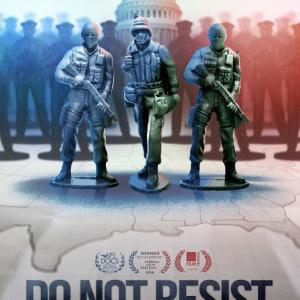
Image from IMDB.com
Forcing the Law
Do Not Resist , the 2016 Tribeca Film Festival’s Best Documentary winner, directed by Craig Atkinson, is a critical glimpse into the militarization of policing in the U.S. Where will hyped-up police training, battle armor, weaponry, and surveillance technology take us? Vanish Films
Inquiring Minds
Wary of science, or seeking a way to engage those who are? How I Changed My Mind About Evolution: Evangelicals Reflect on Faith and Science gathers stories from pastors, biblical scholars, theologians, and scientists. Edited by Kathryn Applegate and J.B. Stump. IVP Academic
Just Insights
In Radical Dharma: Talking Race, Love, and Liberation, Rev. angel Kyodo williams, Lama Rod Owens, and Jasmine Syedullah are igniting conversations in Buddhist communities around the country about the legacy of racial injustice and white supremacy in their religion. North Atlantic Books
Worldly Prayer
Through diverse writers and his own experience, Orthodox priest Michael Plekon looks beyond the formal and liturgical in Uncommon Prayer: Prayer in Everyday Experience. What are the permutations of the “Prayer of Pierogi Making”? Why should we not fear the “Prayer of Darkness”? Notre Dame Press
New & Noteworthy
Four June cultural recommendations from our editors.

Courtesy of disturbingthepeacefilm.com
Choosing a Different Way
The documentary film Disturbing the Peace describes the path former Israeli soldiers and Palestinian fighters took from armed conflict to nonviolent peace activism, resulting in the creation of Combatants for Peace. A model for overcoming polarization and rejecting violence, in an unlikely place. disturbingthepeacefilm.com
Faith Remix
Author Melvin Bray presents a creative, questioning, culturally engaged approach to our sacred stories as a path to a stronger, more just, and loving faith. Better: Waking Up to Who We Could Be is a resource for Christians “for whom uncritical certitude is no longer working.” Chalice Press
Displaced People
Global Migration: What’s Happening, Why, and a Just Response explains key issues linked to contemporary migration and practical responses, guided by principles of Catholic social teaching. By Elizabeth W. Collier and Charles R. Strain with input from Catholic Relief Services. Anselm Academic
Prophets of Profit
In Brand® New Theology: The Wal-Martization of T.D. Jakes and the New Black Church , Paula L. McGee encourages pastors and scholars to see prosperity churches as a formidable force. She explores such churches’ troubling interweaving of commerce and faith and how they disempower their majority-female congregations. Orbis Books
Letters to the Editor
Letters to the Editor from Sojourners readers
Spirit of Compassion
I read with great interest the article on Northmead Assembly of God’s Circle of Hope AIDS clinic in Zambia (“When the Spirit Comes Down,” by Wonsuk Ma, January 2017), because I spent six months in 2011 conducting research there with support groups for people living with HIV. Clinic clients I interviewed reaffirmed my observations about staff members’ dedication, often reporting that they were grateful that the clinic was in their low-income neighborhood. Most crucially, I noted how staff members showed acceptance and compassion toward all clients. While the clinic faces challenges—long lines, clients who sometimes do not adhere to their medications, excellent staff members who may be “poached” by other donors—it does important work in Zambia’s AIDS response.
Amy Patterson
Sewanee, Tennessee
Charismatic Failure
It is encouraging to hear about the good work being done in Pentecostal churches around the globe (“When the Spirit Comes Down”). However, there was not one word in the article about the plight of homosexuals living in these societies. These churches are often at the forefront of oppressing gay people in the name of religion. Until we all confront the horrific situation of gay people (ostracism, forced marriage, beatings, prison, and execution) in so many places, especially Africa and the Caribbean, I can’t take these churches or their brand of religion seriously.
Robin Van Liew
Holden, Massachusetts
Crowning Achievement?
Thank you for providing a magazine that I am able to count on for intelligence and sensitivity in both your writing and reporting. However, I must take exception to the claim that Elizabeth I “founded” the Anglican Church (“Entering my ‘Power Decade,’” by Catherine Woodiwiss, January 2017). While it is true she is credited for the eponymous settlement, those acts of Parliament did not “found” anything that did not already exist. They smoothed the waters so that the English church could proclaim the gospel in relative peace.
Carlton Kelley
Traverse City, Michigan
Hillbilly Business
I want to thank you for publishing the article by Susan K. Smith on John Rush in your December 2016 issue (“Can Business Be Beautiful?”). It presents a different (and more accurate) example of Appalachia than does J.D. Vance’s book Hillbilly Elegy. As a born-and-bred hillbilly, I take great umbrage at Vance’s book. It is a very courageous memoir of one family, but that’s what it is—the story of one very dysfunctional family and the salutary effects of the Marines on one very mixed-up young man. Most poor and working-class Appalachians have not become as disoriented and dysfunctional as Vance’s family. Many of them, like Rush, have started enterprises of their own or are otherwise engaged at jobs they find rewarding. While not all these businesses are social enterprises as is Rush’s, they all nevertheless indicate successful adjustments to situations in which people find themselves.
Mike Smathers
Crossville, Tennessee
Assets in Heaven
Please do more articles on businesses that have doing good in the world as their bottom line (“Can Business Be Beautiful?”). Business owner John Rush makes a point about the profit-making business model that it is the love of money that is a problem, not having money itself. A current line of research, however, is showing that it isn’t as simple as that; money and decision-making power over others quickly reduce compassionate awareness and behavior. Jesus was right about wealth: Good motivations and intentions are not enough. Any condition that reduces our sense of shared vulnerability with others works against our ability to live lives of universal love.
Arden Mahlberg
Madison, Wisconsin
Letters to the Editor
Letters to the editor from Sojourners readers
Hipster Privilege
D.L. Mayfield’s article (“Church Planting and The Gospel of Gentrification,” July 2017) hit home and is an important conversation. Out of economic necessity after a bout of homelessness, I moved into a neighborhood jokingly referred to as “meth alley” by the uptown people. Our neighborhood health statistics were dismal because of poor access to anything resembling fresh food. When we became the object of “saving” by some churches from the other side of town that wanted to be missional, they didn’t ask us what we needed. We became the project of outreach by young, white, educated, privileged religionists intoxicated by their specialness. The exuberant youths were quite clueless that we had some wisdom about what our neighborhood could use. Most were from two local Bible colleges and had grand ideas about urban outreach.
They planned a hipster coffee shop that the evangelical whites with privilege would use as a base of operation, providing tutoring to our youth. They believed they would open their doors to the unfortunate of my dismal neighborhood and we would come flooding in to be saved by their great goodness from our great need.
I just wanted to recover and get a job. What my saviors failed to see without exception were my strengths—my resilience, the gifts I wanted to bring to my community, and my long experience with making do in the most hostile of circumstances. They could have asked, and I would have told them patiently, but they weren’t listening because they knew all there was to know about poverty and how to fix it.
I didn’t have the gas money to get to church; they were going to Hawaii for a break from us.
My suggestion: If any church or Bible college wants to be missional, ask the community what they most need. Ask who the community leaders already are and help them! Jobs and microloans to small neighborhood businesses are a place to start. Transportation opportunities to those jobs and access to good food are tangible helps. Without giving neighbors the dignity of being understood as people that have much to contribute to our own communities, being “missional” alienates and harms.
Grace Boyd
Sequim, Washington
Summer Psalms
Thanks to Danny Duncan Collum for introducing me to Jessi Colter’s album The Psalms (“Strange and Beautiful Psalms,” July 2017). It is a balm to me during this summer’s heat. Once you hear it, there’s no turning back.
Dennis Abney
Orlando, Florida
New Language Needed
Regarding Leslie Copeland-Tune’s article “What Are Block Grants” in the June 2017 issue: I am frustrated when Medicare and Social Security are called “entitlement” programs. Of course, all who have contributed into each fund during their working lives are entitled to the benefits we receive, but Medicare is a federal health insurance program and Social Security is a federal retirement program. Unfortunately, both funds have been raided by Congress for other purposes and are now in some jeopardy. Perhaps if we used language other than “entitlements,” which gives the impression of being undeserved, these programs would be held in higher regard and protected.
Susan Holcomb
Newberg, Oregon
From Just War to Just Peace
An Appeal to the Roman Catholic Church to Re-Commit to the Centrality of Gospel Nonviolence
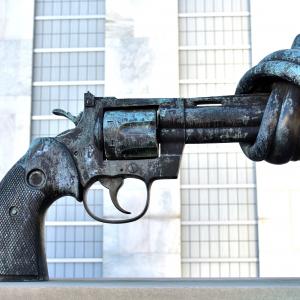
Lee Nanjoo / Shutterstock.com
1. Continue developing Catholic social teaching on nonviolence. In particular, we call on Pope Francis to share with the world an encyclical on nonviolence and just peace.
2. Integrate gospel nonviolence explicitly into the life, including the sacramental life, and work of the church through dioceses, parishes, agencies, schools, universities, seminaries, religious orders, voluntary associations, and others.
3. Promote nonviolent practices and strategies (e.g., nonviolent resistance, restorative justice, trauma healing, unarmed civilian protection, conflict transformation, and peacebuilding strategies).
4. Initiate a global conversation on nonviolence within the church, with people of other faiths, and with the larger world to respond to the monumental crises of our time with the vision and strategies of nonviolence and just peace.
5. No longer use or teach “just war theory”; continue advocating for the abolition of war and nuclear weapons.
6. Lift up the prophetic voice of the church to challenge unjust world powers and to support and defend those nonviolent activists whose work for peace and justice puts their lives at risk.
The Catholic Nonviolence Initiative is a consortium of attendees from the Rome conference and others who are advocating for a papal encyclical on nonviolence. Read the full statement at nonviolencejustpeace.net.
Letters to the Editor
Letters to the editor from Sojourners readers
A Red Flag?
Regarding the Episcopal church called “The Cathedral of the Confederacy” (“Robert E. Lee Worshipped Here,” by Betsy Shirley, April 2017): Token efforts of repentance such as the removal of the Confederate flag will not suffice; full biblical repentance requires massive restitution in order to repair the enormous oppression and damage done to African-American people over the centuries.
Lowell Noble
Riceville, Iowa
Spoiler Alert
It’s always great to read about an entrepreneur who shows that justice can be good business (“Grocery Store Inequity,” by Courtney Hall Lee, April 2017). I was interested to read of Jeff Brown’s effort to introduce quality, convenient shopping to low-income areas of Philadelphia because I lived in the southwest Germantown part of that city for two years back in the mid-1980s. I quickly noticed, when visiting the suburbs, that perishable food was much more plentiful and varied and lasted longer than food I bought at the “supermarket” a mile away from my apartment. One can only suppose that low-income folk did not find expensive, quickly spoiled food appealing and, since they didn’t buy it, healthy, fresh food was harder and harder to get. People are too often blamed for their own poor health habits. Please keep informing about the barriers faced in the name of “just business.”
Ann Larson
Essex, Vermont
Spivey’s Still Got It
Regarding “The Trump Presidency, One Year Later,” by Ed Spivey (April 2017): I laughed so many times that my wife wanted to read it! I think humor may be one of the best antidotes for the toxicity of our times. Spivey’s humor is also self-deprecating, which is more effective than the self-righteousness I feel and express so often. Thank you, Ed, for making us laugh while reminding us that we have all sinned and come short of the glory of God.
Charles R. Crawley
Cedar Rapids, Iowa
Don’t Discount Adam Smith
Several points from your interview with Chuck Collins (“Wealth and the Common Good,” March 2017) illustrate the compatibility of his ideas with the economic system of capitalism proposed by Adam Smith. Smith sharply criticized stark economic inequalities. He advocated good wages for workers, writing that efficiencies in the division of labor made it possible to spread wealth even to the lowest ranks of the people. He advocated progressive taxation. And he argued that people were the same—no “myths of deservedness” for Smith. Finally, while Smith did not say anything about campaign finance reform, his excoriating comments on the political power of the wealthy are potent. The clear inference is that the wealthy should not have disproportionate electoral power.
For too long, American political discourse has featured a false dichotomy between capitalism and socialism. This dichotomy has been based on a gross distortion of Smith’s system. It is time to change the conversation to what kind of capitalism would be best for the country and the world: the savage capitalism of recent decades, or the capitalism with justice and equal opportunity that Smith advocated.
John E. Hill
Quincy, Massachusetts
“But what about ...?” Write to letters@sojo.net or Letters, Sojourners, 408 C Street NE, Washington, DC 20002. Include your name, city, and state. Letters may be edited.
Letters to the Editor
Letters to the editor from Sojourners readers
Eye of the Beholder
In “Where Protestantism Went Wrong” (February 2017), Wesley Granberg-Michaelson rightly critiques some of the consequences of the Reformation. Surely he is inaccurate, however, in arguing that “the Reformation bred a mistrust of aesthetics.” It would be more accurate to state that it promoted a different aesthetic than that prevalent in Catholicism. New England Puritans, for example, developed a “plain style” in literature and architecture evident in the accessible prose of William Bradford’s Of Plymouth Plantation and the beauty of many Congregational churches still standing in town squares. This plain style influenced modern literature and the “form follows function” aesthetic of much modern architecture. Sometimes, to quote a fine expression of the Protestant aesthetic, “ ’tis a gift to be simple.”
Walter Hesford
Moscow, Idaho
Name Drop
Jim Wallis has asked the question that I, and I am sure others, have been wrestling with for some time: “What is an evangelical?” (“White Evangelicals and the Election,” January 2017). As an 81-year-old Lutheran pastor, I have been advocating that the Evangelical Lutheran Church in America drop the word “evangelical” from our name. The word has been hijacked; the original meaning has been perverted! Retaining the word in our church’s name distorts the very heart of our identity. The change should not be that significant for Lutherans; when “evangelicals” meet, the ELCA is usually absent. It is sad but true that other words must be employed to convey the powerful identity that the word evangelical once held.
Bernard Kern
North Richland Hills, Texas
Stick to the Facts
I was disappointed in your January 2017 issue’s exclusive focus on the danger Trump poses because of a “racist, misogynistic, ethnocentric brand of nationalism” and policies that likely will hurt poor, vulnerable people (“Is America Possible?” by Heath W. Carter). What of his cavalier attitude toward facts, evidence, and truth, such as his disputing the overwhelming scientific evidence for human-caused global warming? When our culture is on a binge of finding “truth” in unwarranted places, and people are believing what they want to believe no matter how far off the mark (with the encouragement of our president), our democracy is in serious, long-term danger.
Roger Brooks
Madison, Wisconsin
Stop Talking
In David Gushee’s November 2016 piece on abortion (“The Abortion Impasse”), where are women’s voices? Where is the acknowledgment that there are no women’s voices here? Gushee supports not banning abortion. In some cases. I get that. But the rhetoric, implicit and explicit, embodied in such statements and phrases as “abortion is the sad song that never ends,” “the everyday ‘garden variety abortions’ go on and on,” and “that miserable drive to the abortion clinic” send chills of exclusivity, domination, privilege down this reader’s spine. “What is an anxious Christian to do about all this?” Listen to women’s and girls’ stories. Listen. And listen. And listen.
Priscilla Atkins
Holland, Michigan
New & Noteworthy
Four December culture recommendations from our editors.

Meaghan O'Malley / Creative Commons
Refusing Silence
The documentary film The Uncondemned tells how a group of international lawyers and activists, all under 35 when they began, fought to get the first conviction of rape as a war crime—and how Rwandan women defied death threats to testify and win justice. theuncondemned.com
Welcoming the Light
In The Light of the World: Daily Meditations for Advent and Christmas, Phyllis Zagano, writer and scholar of Catholic spirituality and women’s leadership in the church, offers incisive reflections and prayers to help readers “become quieter, slower even, pointing to the Christ who is to come.” Twenty-Third Publications
Power-Pop Prophets
The Shondes, a queer, feminist pop-punk band from Brooklyn, weave activist fervor with progressive Jewish prophetic imagination and spirituality: “Hope can anchor any strategy,” is a telling lyric. The melodious songs on their new album, Brighton, soar with violin and Louisa Rachel Solomon’s clear, strong voice. Exotic Fever Records
Home in a Strange Land
Words in Transit: Stories of Immigrants is a book of oral histories from nearly 30 immigrants and refugees who have settled in western New England. Edited by Ilan Stavans, with photographs by Beth Reynolds, it presents snapshots of the courage and gifts that flow to our country. New England Public Radio
New & Noteworthy
Four July cultural recommendations from our editors.
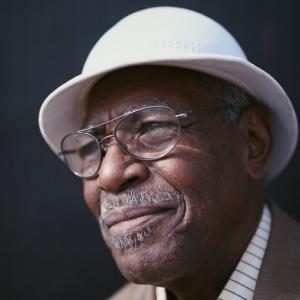
Courtesy of facebook.com/DonBryantMusic/
Silver Soul
Memphis-born Don Bryant, who is 74 but sounds decades younger, has made a throwback-yet-fresh soul album, Don’t Give Up On Love. Along with the standout, gospel-fired “How Do I Get There?” are exuberant grooves and smooth ballads on more earthly themes. Fat Possum Records
Mutual Respect
Evangelical-rooted professors Marion H. Larson and Sara L.H. Shady believe interfaith dialogue is vital—and doesn’t demand watered-down faith. In From Bubble to Bridge: Educating Christians for a Multifaith World , they offer Christians the perspective and tools to build bridges. IVP Academic
Every Day Holy
Faithful Families: Creating Sacred Moments at Home , by Traci Smith, offers 50 do-it-yourself ideas to incorporate spiritual practice into the bustle and hum of families with children. Includes activities suitable for different age levels (including the child at heart). Chalice Press
Write Me a Letter
Shortly after the 2016 U.S. election, novelist Carolina De Robertis invited writers and activists to explore themes of hope in epistolary essays. The result is Radical Hope: Letters of Love and Dissent in Dangerous Times, with Junot Diaz, Alicia Garza, Jane Smiley, Jeff Chang, Celeste Ng, Hari Kunzru, and others. Vintage
Letters to the Editor
Letters to the editor from Sojourners readers
Veterans’ Affairs
Wonderful to see Standing Rock featured on the front cover and within the February 2017 issue (“A Chorus of Resistance,” by Gregg Brekke). One other moment people might have missed: Some among the thousands of veterans supporting the water protectors went down on their knees to apologize for the atrocities committed by Army units against the Sioux people over the centuries of white hegemony. The elders forgave them. I, for one, wept at the grace of this.
Katharine Preston
Essex, New York
Where Two or More Are Gathered ...
There are some things in the article “Where Protestantism Went Wrong” (by Wesley Granberg-Michaelson, February 2017) that leave me unsettled. The article seems to indicate that a single person (a bishop or whomever) is a better arbiter of the truth than a council or a group (presbytery, synod, etc.). By declaring the priesthood of all believers, the Reformation raised up the importance of all people—educated, ordinary, or otherwise. My experience has been that, on the whole, a council or group is more likely to arrive at a truthful, correct, or workable solution to whatever issue is before them than any one individual in the group.
Mike Smathers
Crossville, Tennessee
‘Duck’ And Cover?
I finished my reading of Rose Marie Berger’s “Mosquito Manifesto” (February 2017) with a positive feeling. Almost immediately, however, another image flashed through my mind: a short cartoon in which Donald Duck goes on vacation. Sitting in his lounge chair on the lawn, relaxing at last, Donald is set upon by a lone mosquito. Those who know the temperament of Donald Duck can guess the outcome. The final scene shows the mosquito escaping into the sky as Donald destroys his mountain cabin with shotgun blasts in a last vain attempt to rid the world of this pesky mosquito.
Is there not a real danger that instead of bringing down the giant, Lilliputian style, we mosquitos might actually provoke annihilation, not just of ourselves but of many unintended victims of the wrath of the powerful who will not care who they hurt in their attempts to rid the world of us?
David Tidball
Roseville, Minnesota
Not Alter Egos
In the February 2017 issue of Sojourners, Will Willimon makes an excellent case for the need to address racism from the pulpit (“Preaching the Devil Out”). However, as a Christian mental health professional, I disagree with his contrast between preaching and psychotherapy. I agree the two are separate, but one is not inferior to the other. Willimon characterizes psychotherapy as a luxury only privileged people use. This is based on historical fact, dating back to Freud, when psychoanalysis was provided only to the very richest. Today, however, mental health is constantly striving to be available to the poor and culturally diverse. I can think of no other institution, including the American church, that is more dedicated in practice to understanding and spreading unity among diverse people groups. I suggest that therapists and pastors pursue this goal together, using our unique talents in tandem, instead of trying to become an alternative to the other.
Nick Schollars
via email
“On the other hand…” Write to letters@sojo.net or Letters, Sojourners, 408 C Street NE, Washington, DC 20002. Include your name, city, and state. Letters may be edited.
New & Noteworthy
Four January culture recommendations from our editors.
Woman of Valor
Coretta Scott King walked alongside her husband Martin Luther King Jr. in the civil rights struggle—and kept on working for social justice after his assassination, until her death in 2006. My Life, My Love, My Legacy is her perspective, as told to Barbara Reynolds. Henry Holt
Come Together
In Embrace: God’s Radical Shalom for a Divided World, Leroy Barber draws from decades of ministry among diverse people to argue for the centrality of relationships across differences to achieving not just reconciliation, but true justice. Encouraging, openhearted words for divisive times. IVP Books
Testify
Sometimes, liberal Christians feel they need to apologize for the behavior of other Christians or churches. In Tired of Apologizing for a Church I Don’t Belong To: Spirituality without Stereotypes, Religion without Ranting, writer and pastor Lillian Daniel encourages you instead to boldly tell your own story of faith and sacred relationship. Faith Words
Street Church
The Revolution Has Come , by Rev. Sekou & The Holy Ghost, was released in early 2016—but its gritty mix of R&B and gospel, freedom and resistance is more relevant every day. Activists/artists Osagyefo Sekou and Jay-Marie Hill met at a Black Lives Matter protest, and street movements permeate the songs. rshgmusic.com
Letters to the Editor
Letters to the editor from Sojourners readers
Pricing Carbon Fuels
Thank you for your fine article on climate change (“Shattering the Silence on Climate Change” by Teresa Myers, Connie Roser-Renouf, and Edward Maibach, May 2017). There is no larger long-term challenge facing humankind. The mention of Citizen’s Climate Lobby deserves expansion. This grassroots, nonpartisan, national group has a very workable, market-friendly proposal to help us move forward: enacting a steadily rising federal fee on all carbon-based fuels (coal, oil, and natural gas). The net revenues from this fee would be returned on an equal per capita basis to all legal U.S. residents. Such a fee would correct a failure of the market to properly price the environmental and social costs associated with use of these resources. It would have a positive impact on economic growth, would favor a transition to nonpolluting energy resources, and would be fair to low-income residents.
Kenneth Piers
Grand Rapids, Michigan
The Pride of Milwaukee
One of the names in Lisa Sharon Harper’s “Find the Cost of Freedom” (May 2017) was instantly familiar to me: James Cameron, the only young man “spared” from lynching, by imprisonment. I only wish Harper could have gone further in highlighting Cameron’s life. Having lived most of my life in the Milwaukee metro area, I have heard so much about Cameron—an extremely studious man and founder of the Black Holocaust Museum, a one-of-a-kind exhibition. Cameron was an exemplary man. He should be much more well-known than he is, and for much more than that he escaped a lynching. He was (and still is, as his heritage lives on) a very important man for Milwaukee residents.
Lynne Gonzales
Pewaukee, Wisconsin
Heartless Housing Policy
I was very happy to read the recent article “Raise Your Hand if You Live in Subsidized Housing,” by Neeraj Mehta (June 2017). It helps to uncover how we “allocate resources to people we value” and shows the inequality of how we subsidize housing in America. From my work with Hearts for Homes in Macomb County, Mich., it is clear to me that negative biases and stereotypes of low-income renters justify inaction on the part of policy makers and middle-class Americans. With the numbers of homeless children on the rise, at a time when employment is the highest since 2001, we still easily blame the poor as “not being responsible” or “having bad spending habits.” However, we seem unable to acknowledge or take responsibility for a housing system that requires many families to pay more than half of their income in housing expenses, putting many at risk of homelessness.
Richard Cannon
Mt. Clemens, Michigan
Cone’s Cross
Reading Danny Duncan Collum’s piece on Reinhold Niebuhr (“The Niebuhr We Need,” April 2017) and viewing the new documentary by Martin Doblmeier sent me back to my own review of America’s cold war theologian (“Apologist of Power,” March 1987). I write to commend James Cone’s chapter on Niebuhr in The Cross and the Lynching Tree (Orbis, 2011). Cone argues that Niebuhr’s theology of the cross was so abstract that it never occurred to him to recognize the most obvious representation of the former in the latter. Though still faculty at Union Seminary, Cone was not interviewed for the film.
Bill Wylie-Kellermann
Detroit, Michigan
Your response here. Write to letters@sojo.net or Letters, Sojourners, 408 C Street NE, Washington, DC 20002. In-clude your name, city, and state. Letters may be edited.
Letters to the Editor
Letters to the editors from Sojourners readers
Unchaining Hope
Thank you for uplifting one of North America’s most prophetic and inspirational persons of our time, Daniel Berrigan, SJ (“The Unchained Life of Daniel Berrigan,” August 2016). He was one of the most hopeful people for change in a time and an era when many of us felt little hope for change in the status quo. I never met him personally but was inspired by both who he was as a person and his commitment to a theology of personal involvement and activism for peacemaking.
John Fogleman
Ontario, Canada
Shame and Blame
Jim Wallis’ analysis of “intersectionality” (“The Categories That Divide Humanity,” July 2016) felt to me like an attack on local, traditional cultures, particularly those that are “white.” As a lifelong rural pastor, I know well the propensity of rural communities toward ethnocentrism. And within the context of American society, all white traditional cultures certainly bear the burden of racism. But the solution is not to dismantle all local, traditional cultures, but to fashion communities that value their heritage along with the heritage of all other cultures. Wallis’ shame-and-blame language not only fails to effect positive change in local, traditional cultures but also may well be the kind of “politically correct” discourse that drives traditional “whites” to embrace political demagogues.
S. Roy Kaufman
Freeman, South Dakota
Letters to the Editor
Letters to the editor from Sojourners readers
Unfounded Intimations?
Responding to the recent Sojourners article by Ryan Rodrick Beiler (“Undeterred by the Facts,” February 2017) regarding the arrest and detention of World Vision Gaza Director Mohammed el-Halabi, I would like to clarify the following pertinent issues.
El-Halabi has been indicted on charges of membership in a terror organization, use of material goods for terror, providing intelligence and material aid to the enemy in wartime, and illegal possession of arms and ammunition. If a plea deal will not be agreed between the sides, the Israeli state prosecution will present evidence on all these charges in a manner consistent with due process, fair trial, and maximum possible transparency given security considerations.
Hence, it is hard to understand Rodrick Beiler’s conclusion that Israel is “undeterred by the facts.” The case will move forward based only on evidentiary fact. Beiler also questions why Israel would level such charges against a Christian aid organization. The only reason is that, unfortunately, due to lack of adequate oversight, the charges appear to be true. This is probably why Western donor countries have suspended aid to World Vision Gaza operations pending trial.
We also reject and totally deny the unfounded intimations in Rodrick Beiler’s report that el-Halabi has been mistreated in Israeli custody. This is not the case. El-Halabi has also had access at all times to professional medical care and has been visited by his attorneys and family.
Itai Bardov
Embassy of Israel
Washington, D.C.
Ryan Rodrick Beiler Responds:
Itai Bardov writes at length about the fair trial that Mohammed el-Halabi will be granted by the Israeli legal system. He then declares that “the charges appear to be true.” This is consistent with the Israeli foreign ministry’s campaign, as described in my article, to hype el-Halabi’s presumed guilt long before due process has had the chance to take its course.
Recent and extensive documentation by international, Israeli, and Palestinian human rights organizations (Amnesty International, Human Rights Watch, B’Tselem, Al Haq, and others) has indicated routine use of torture and other forms of abuse of Palestinians within the Israeli legal system, adding credibility to el-Halabi’s allegations of such treatment.
Regarding el-Halabi’s alleged crimes, and the claim that “Western donor countries have suspended aid” to World Vision, I would direct Bardov to the recent investigation conducted by the Australian government’s Department of Foreign Affairs and Trade, which “uncovered nothing to suggest any diversion of government funds” on the part of el-Halabi.
While it is doubtful that the Israeli legal system will offer el-Halabi a “fair trial and maximum possible transparency,” as Bardov claims, it is certain that World Vision, the Australian government, and the international human rights community present a very different narrative from that offered by Netanyahu’s right-wing Israeli government. Whom will you believe?
Correction: Our May 2017 issue credited climate change research to the Yale Program on Climate Change Communication. The surveys were actually a partnership between George Mason University’s Center for Climate Change Communication and the Yale program.
“On the other hand…” Write to letters@sojo.net or Letters, Sojourners, 408 C Street NE, Washington, DC 20002. Include your name, city, and state. Letters may be edited.
